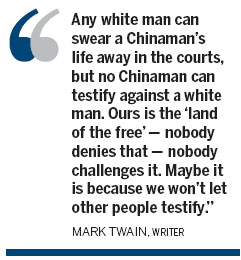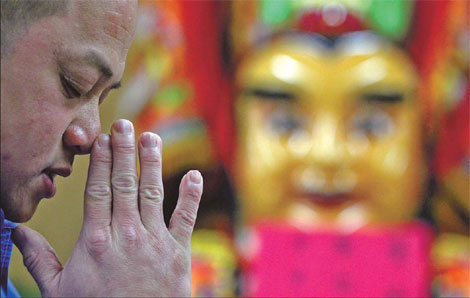Books
The first Chinese to gamble on Wild West
Updated: 2011-04-15 07:41
By Kelly Chung Dawson (China Daily)
|
A man prays at the Mazu Temple in the Chinatown district, San Francisco, a city which attracted thousands of Chinese gold seekers in the mid-19th century. Provided to China Daily |
The American Gold Rush of 1848-1852 continues to define the American dream to this day, drawing tens of thousands of people to the Wild West in an entrepreneurial sprint for glory and wealth. But little has been written about the large numbers of Chinese miners who were among the gold seekers.
Thousands of Chinese traveled to the United States to make their fortunes, setting up early Chinatowns in mining settlements across the West before resentment and racism forced them out of the US with the enactment of the Chinese Exclusion Act of 1882.
In Christopher Corbett's new book, The Poker Bride, he tells both their story and the story of one particular woman.
Polly Bemis, the concubine of a wealthy Chinese merchant, was by most accounts lost in a poker game to a man named Charlie Bemis, who took her to live with him on an isolated ranch in Idaho. Several years later, he married her, an entirely unheard-of move at the time. When she emerged from the mountains nearly half a century later, she was greeted with great fanfare and fondness, as the legendary "Poker Bride".
Corbett tells the story of Polly's life in the context of the larger history of Chinese gold miners in the US, weaving details of her journey into painstakingly researched accounts of San Francisco's Chinatown, the lives of both Chinese miners and prostitutes in the US, and the social environment that may have set the stage for the Exclusion Act, which suspended Chinese immigration for over 60 years.
In those days, Chinese who came to the US to work either on the railroads or in gold mines were called "sojourners" or more exotically, "celestials". They tended to stick together, often made no attempt to learn English, and planned to stay in the land of "Gold Mountain", as the US was then known in China, only long enough to make a fortune to take home.
 |
"Word of the discovery of gold in the California hills in the winter of 1848 had the same impact among the peasants of the densely populated Pearl River delta in southern China as it did in Boston's Back Bay or along the rocky coast of Maine," Corbett writes.
In 1852, over 25,000 Chinese immigrants had arrived in California to mine gold. "The Chinese would have an almost immediate impact on California, for not only did they immigrate in significant numbers, but they would soon corner the labor market in jobs no one else wished to do The Chinese would do any work and they would do it cheaply," Corbett writes.
This would later contribute to the resentment against the Chinese population, which, coupled with their complete lack of desire to assimilate, likely sealed their fate in some ways. White workers felt that the Chinese were taking their jobs, Corbett says in an interview with China Daily.
"Most of that was nonsense," Corbett says. "Organized labor manipulated and exploited that whole scene. The Chinese never constituted a huge threat to anyone's job."
But the Chinese had defenders in the press, Corbett writes in the book. He includes an excerpt from Mark Twain's Roughing It, in which Twain wrote: "[The Chinese] are quiet, peaceable, tractable, free from drunkenness, and they are as industrious as the day is long. A disorderly Chinaman is rare, and a lazy one does not exist He is a great convenience to everybody - even to the worst class of white men, for he bears the most for their sins, suffering fines for their petty thefts, imprisonment for their robberies, and death for their murders.
Specials

In the swim
Out of every 10 swimsuits in the world, seven are made in China.

Big spenders
Travelers spend more on shopping than food, hotels, other expenses

Rise in super rich
Rising property prices and a fast-growing economy have been the key drivers.
